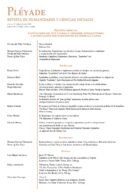The Discursive Dimension of Green Grabbing: Palm Oil Plantations as Climate Protection Strategy in Brazil

Published 2016-12-26
Keywords
- Green Grabbing,
- Primitive Accumulation,
- Bioeconomy,
- Biofuels,
- Palm Oil
- Brazilian Amazon Basin ...More
How to Cite

This work is licensed under a Creative Commons Attribution-NonCommercial 4.0 International License.
Abstract
Drawing on the Marxist concept of continuous primitive accumulation, green grabbing is defined as a flexible analytical tool in order to understand the establishment or restructuring of capitalist relationships of ownership and production in the context of strategies dealing with climate change. However, green grabbing as a new expression of primitive accumulation not only involves the material process of appropriation, but also a specific discursive framing s a “green” or sustainable solution. Thus, this paper argues for the re-interpretation of the concept of primitive accumulation with a special focus on its discursive dimension. The main argument is that the discursive dimension is already envisaged in the implicit ideological criticism of primitive accumulation. Consequently the concept should be extended, drawing on Stuart Hall’s deliberations on ideology and discourse. The analytical concept of green grabbing is applied to a case study on the state-supported expansion of palm oil plantations for biodiesel in so-called degraded areas in the Brazilian Amazon basin. This process of green grabbing remains mostly unquestioned because of the powerful narrative of the “degraded areas in the tropics”. The narrative enables the re-framing of the palm oil plantations as climate protection strategy and so delegitimizes local resistance.